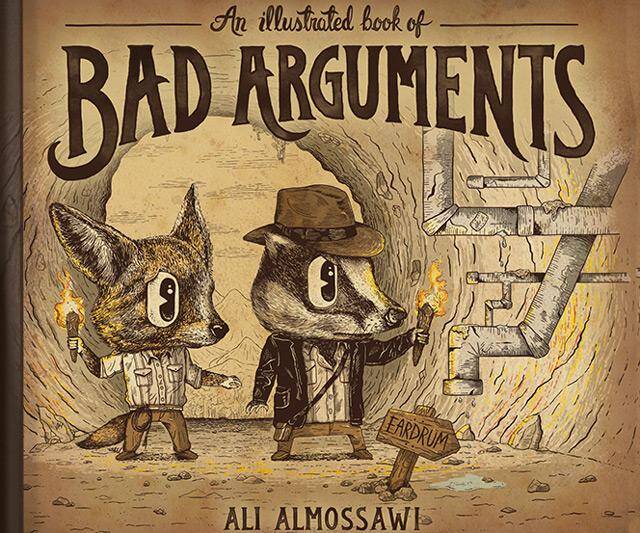An Illustrated Book of Bad Arguments | |||||||||||||
| |||||||||||||
Product Description
“A flawless compendium of flaws.” —Alice Roberts, PhD, anatomist, writer, and presenter of The Incredible Human Journey
The antidote to fuzzy thinking, with furry animals!
Have you read (or stumbled into) one too many irrational online debates? Ali Almossawi certainly had, so he wrote An Illustrated Book of Bad Arguments! This handy guide is here to bring the internet age a much-needed dose of old-school logic (really old-school, a la Aristotle).
Here are cogent explanations of the straw man fallacy, the slippery slope argument, the ad hominem attack, and other common attempts at reasoning that actually fall short—plus a beautifully drawn menagerie of animals who (adorably) commit every logical faux pas. Rabbit thinks a strange light in the sky must be a UFO because no one can prove otherwise (the appeal to ignorance). And Lion doesn’t believe that gas emissions harm the planet because, if that were true, he wouldn’t like the result (the argument from consequences).
Once you learn to recognize these abuses of reason, they start to crop up everywhere from congressional debate to YouTube comments—which makes this geek-chic book a must for anyone in the habit of holding opinions.
Top Reviews
Exactly what is promised- A fun single reference for better thinking and listening.by Phred,Top Contributor: Manga (4 out of 5 stars)
March 18, 2016
Ali Almossawi's Bad Arguments is exactly the kind of book more people should keep at hand. In a few pages 20 different logical fallacies are identified and clarified. As something of a freebie there is a short glossary appended.
I never quite understood "�post hoc, propter hoc'. I only thought I understood "�slippery slope'. New to me were the terms that address things like 'not a cause for a cause' or "�composition and division'.
Having read this slender book I cannot claim to have mastered these terms, nor will I always recognize them in the wild. Still for a book of barely 50 pages; almost ½ given to illustrative cartoons, the learning experience is efficient.
A few words about the illustrations. For all their childlike appeal each one is well captioned to reinforce the point of the explanation.
This is one time I have to question the negative reviews. Too many are obviously driven by a demand for political purity that has nothing to do with the total content of the book. A few other complain that the logic is wrong - I disagree. Others are of the opinion that the discussion is too shallow. This is not a text book.
Unless you are a serious student of logical argument, Bad Argument may be the only reference you will ever need. A light hearted book with the ability to seriously improve your thinking, speaking and listening.
Book displays ironic bias in its examples that undermine the whole topic of logical fallacies
by J. Green (1 out of 5 stars)
September 5, 2019
I bought these books to coach a debate team as a parent. Imagine my surprise to find that a book on logical fallacies commits numerous examples itself, and displays clear anti-religious and political bias.
As a positive, I do think the descriptions and definitions of the logical fallacies were fairly accurate and presented well enough for smart children to grasp. So I will say that. It is in the examples where the bias and breakdown of logic occurs.
A few examples:
In the very first section on Arguments from Consequences, the author refers to Dostoevsky's assertion, "If God does not exist, then everything is permitted." First, the author presents this as a quote, which it is not. It is a paraphrase of two different sentences within a dialogue that cannot be construed to be a complete, self-contained logical argument. Second, the statement quoted in the book is actually perfectly valid and useful as a rigid logical concept when debating any atheist who claims that morality is objective. Without the context of the argument, the author misleads the reader into thinking that that statement is always fallacious. That's simply wrong. There are numerous, more basic and completely self-contained examples of an Argument from Consequence fallacy the author could have used.
On the opposite, illustrated page, we find another example of an Argument from Consequences. The argument, "Well, if I get rid of our cows, then we will have to walk everywhere, and that would be terrible for morale. Therefore cow emissions are not killing the planet." What is this nonsense? First, this is not an example of any argument I've ever heard anyone give, and it unnecessarily drags in a political topic and bias where none is necessary. The very next page covers the Straw Man argument, which the author might have studied a bit more before coming up with this ridiculous example. Has the author ever even ridden a cow? It's not that easy.
The very next page continues the religion/science theme with the Straw Man argument, which centers on evolution. The presentation here I have no complaints about. The argument presented is a straw man, but is another example of the bias that exists within the book, where numerous other neutral examples could be used.
The following page is odd, covering the Appeal to Irrelevant Authority fallacy. Any appeal to authority is fallacious, but it appears the author takes a minority view here that if many scientists say something, it must be true. We can't all understand General Relativity or quantum mechanics, but we believe in these principles generally because they work, not because of who came up with them. Not so long ago on a cosmic scale, many scientists believed the Earth was the center of the universe.
The next page again exhibits the author's anti-religious bias while covering the Equivocation Fallacy. The example provided is, "How can you be against faith when you take leaps of faith all the time: making investments, trusting friends, and even getting engaged?" Wow. I've never heard of a more ignorant concept of faith, or a more convoluted example of the Equivocation Fallacy. How about the classic kids' example, which is self-contained and clear: "Eating spinach is better than eating nothing. Nothing is better than eating a pizza. Therefore, eating spinach is better than eating a pizza." That's a great, self-contained example of equivocation that doesn't depend on cherry-picking numerous available definitions of "faith". This is just more anti-religious bias creeping into the examples in an infantile manner. The illustrated example on the opposite page is actually great.
The author does decently well, if not presenting cloudy, unclear examples of fallacies through page 28, where he manages to provide some balance by pointing out the Genetic Fallacy, "As men and women living in the twenty-first century, we cannot continue to hold these Bronze Age beliefs." Well done, although in fairness, it would likewise be nice if the author steered clear of religious and political topics.
And that takes me halfway through the book. In summary, had the author lost the anti-religious and political bias presented in the book, and provided more clear-cut, self-contained examples of fallacies, I think this book would be a great teaching aid. As it stands, I cannot recommend the book, will not pass them out to the students, and will be forced to return the lot that I bought.
Just Barely Short of Greatness
by The Helpful Hadrosaur (4 out of 5 stars)
September 2, 2015
This Book seems like it was on the road to greatness, then decided to get published just a moment before it reached it. The design and layout of the book is flawless, and the drawings give off a creepy and simultaneously cute vibe. The book's size is ideal for travel, keeping in your bag, or fitting nicely on the shelf. On to the content. Having learned about logical fallacies in a college course before I purchased this book, I understand that there are many a fallacy that didn't make the final cut. However, I also understand this book never intended to cover everything, It just aims to give a brief coherent summary of fallacies, which it does fairly well. However, on occasion the pictures don't help to clarify the passages, though it seems they are trying to. Also on occasion, It seems the length of the passage just doesn't do enough justice to the fallacy, and it may still be difficult to understand, even after the explanation and the picture. All in all, this book is high-quality and helpful for the Logical Noob and as a reminder to the Fallacy Veteran alike, would recommend.
Solid book for people who like to argue, great for the young-and-naive & old-and-stubborn.
by Dylan Smith (5 out of 5 stars)
August 18, 2017
This book overall is going to honestly be your best friend in the war on the internet if you are a scrub and don't know what you're doing or how to form rational thoughts. That's not to say that I am some master of something as arbitrary as internet arguments, but no joke this book will bolster your ability to spot and see through deception or just point out faulty logic in general.
It's like a magazine in Fallout: New Vegas. No joke. You can look, see the page, see the error and see if it follows through with the erroneous belief presented.
The illustrations are great. The examples are good. Like seriously, I have no faults for this book. If you want to get it as a gag gift for your friend who gets madder than heck on the internet because he's always losing, this might be the thing to help him. Unless you know, you don't want him trying to pull this level of effort on you. In which case, buy this book yourself AND COUNTER ARGUE HIM LIKE AN EPISODE OF YU GI OH WITH LOGIC AS YOUR DECK AND THE HEART OF THE CARDS JUST BEING YOUR HEART YO.
"Learn the lost art of making Sense" with this well presented and approachable little book!
by Muchogustosf (5 out of 5 stars)
December 27, 2016
In this day and age, this subject is more relevant than ever. Errors in reasoning are all around us, flooding the news and infiltrating political discourse (to the extent it even exists anymore!). This cute little illustrated book presents flawed logic in a concise and approachable way. A must read for anyone wanting to navigate complex issues and the arguments surrounding them. Some of my favorites: Straw Man, Equivocation, False Dilemma, Appeal to irrelevant authority, Appeal to Fear, Slippery Slope. 20 Fallacies are presented in total, each with an illustration and an example. Enjoy!!
if you have kids that engage in "spurious" arguments, get them this book!
by Meg (5 out of 5 stars)
January 1, 2018
My 12 year old grandson engages constantly in arguments just for the sake of arguing sometimes, so I got him this book, and he especially like the illustrations, and the simple explanations of the classic bad arguments. Now he gets it when we tell him " that's a spurious argument" or " that is a false dilemma" etc. It was the perfect gift for this kid. The pictures are WONDERFUL.
Wikipedia Article Summaries on Each Page
by Phillip (3 out of 5 stars)
January 13, 2016
I found the logical fallacies here are no better explained than just reading the first paragraph of each fallacy's Wikipedia article. The value of this book to me is that it selects a few of the most popular ones (the Wikipedia "List of fallacies" article is quite long).
The cartoons, although very well drawn, aren't very good at illustrating the logical fallacy they're meant to represent. Many of them feel like they were doodled randomly and it was up to the author to find a way to make them fit with the page's material.
I feel like this book is a missed opportunity. With cutesy animal illustrations, simplified vocabulary, and more relevant examples, this could've been a great gift to give to a kid.
Could be more clear
by Vicky (3 out of 5 stars)
August 30, 2019
If you've ever been in a discussion with someone who says something that doesn't quite make sense but you're not clear why and you can't explain the fallacy, then this book should make everything clear. It should, but it doesn't.
First the pros:
1. I like the size, 7 x 8. It's different, and mine is a slender hard-back book.
2. I like the feel of the pages--very smooth, and they look "antiqued".
3. The illustrations are cute and mostly help to understand the bad arguments.
Now the cons:
1. The author says at the beginning that "this book is aimed at newcomers to the field of logical reasoning, particularly those who ... are so made that they understand best through visuals."
And yet the visuals aren't going to help if they are confusing (the slippery slope illustration--bullies, babies??). The illustration from Appeal to Hypocrisy is another one of these. Circular Reasoning is another.
2. Some explanations of bad arguments are confusing and this could be remedied with more examples from everyday life.
3. Sometimes the examples that are used aren't completely explained, or they're lofty ideas (the modules in the software system from Composition and Division), or they're from ancient history and so aren't as relevant.
All in all I think this book is a good idea that just wasn't taken far enough.
A Must Have Book for your Coffee Table
by Sarah Hemm (5 out of 5 stars)
October 13, 2016
This is a great book for older kids and adults. It is staying right on my coffee table. Everyone should read this book. The illustrations are wonderful and really help explain the concepts. Even my middle school child is starting to understand the different logical fallacies. This is an especially important concept to understand and learn about in today's information age, where you have to sort through so much information to figure out if it is true/logical or not. This book should be taught in every high school and college. The adults in my life (myself included) are also enjoying it, and learning from it. Love it.
Good short overview of bad ways to argue
by Anand Mandapati (4 out of 5 stars)
July 26, 2016
This is a good overview of a bunch of arguments we all make that really don't stand up to logical analysis. Though most of these are very obvious upon reading them, I think we all fall victim or, even worse, perpetrator, to these crimes. Sometimes, we even use them deliberately because we don't have the reasoning to back them up. I can see myself referring to this book frequently after I make arguments to see which of these crutches I might have used so I can reduce and eventually eliminate my usage of them.
Customers Who Bought This Item Also Bought
- Journey into the Whirlwind
- The Misinformation Age: How False Beliefs Spread
- Being Logical: A Guide to Good Thinking
- The Thinking Toolbox: Thirty-Five Lessons That Will Build Your Reasoning Skills
- The Fallacy Detective: Thirty-Eight Lessons on How to Recognize Bad Reasoning
- How to Fake a Moon Landing: Exposing the Myths of Science Denial
- The Amazing Dr. Ransom's Bestiary of Adorable Fallacies
- The Art of Argument
- Mastering Logical Fallacies: The Definitive Guide to Flawless Rhetoric and Bulletproof Logic
- Philosophy for Kids: 40 Fun Questions That Help You Wonder about Everything!
*If this is not the "An Illustrated Book of Bad Arguments" product you were looking for, you can check the other results by clicking this link








